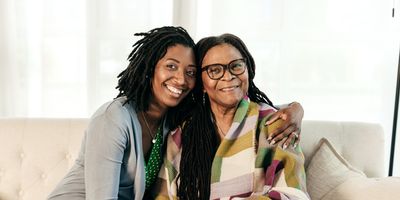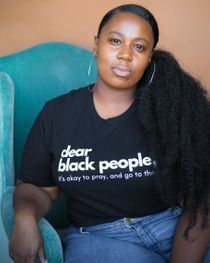Love & Relationships

Ad
Two years ago, I moved out and got my own apartment. I was so proud of that moment because I found a beautiful place and I did it all on my own. A few days after moving in, my Dad called asking if he could borrow money to pay for my little brother's summer camp. Did I have the money? Yes, and honestly, I hesitated to say no because my father is giving, and I love my brother. But I’d just moved out with no help from him or anyone else.
I spent thousands on moving and still had to pay rent, furnish my home, and feed myself, and pay rent again in the next thirty days. So why would he think it was okay to ask me for anything in the middle of one of the most pivotal points of adulthood? My answer is that I'm the oldest daughter.
In recent years, there’s been discussion of the plight of the oldest daughter online. Don’t believe me? Ask yourself why the TikTok hashtag #eldestdaughtersyndrome has over 41 million views, then ask yourself to think of the first oldest daughter you know that comes to mind. She’s exhausted from being there for her family, isn’t she?
What Is Eldest Daughter Syndrome?
Eldest Daughter Syndrome (EDS), while not an official psychiatric diagnosis, is an often unconscious family role that many young girls inherit as the oldest child, in which they find themselves doing more domestic labor and emotional caretaking and face higher expectations than their younger siblings. A clinical review from Don Gasparini, Ph.D., M.A., CASAC, showed how due to this pressure the oldest daughter may face, she can develop certain personality traits or even mental health challenges.
And it doesn’t stop at your siblings; eldest daughters can also find themselves mothering everyone around them due to you taking on that responsibility of parenting children that were not yours.
Eldest Daughter Syndrome Through the Lens of My Mother
My first case study of the oldest daughter syndrome was my own mother. Often, we talk about the countless videos I’d seen on TikTok, and she’d laugh and share their sentiment saying, “It was no joke; you are like the parent that never gets any credit.” Despite living solely with my mother (and not my father or siblings), my childhood, adolescence, and adulthood were rooted in the dynamics of the life of the eldest daughter.
My mother is not only the oldest daughter, but the oldest child, and as her child, she placed expectations on me to do more for my siblings and so did my father.
My siblings and I have never been close despite my desire. Still, as their older sister, she’d instruct me to call them, send birthday gifts, check on them, and it always upset me when after they weren’t receptive, she’d ask me to continue, and so did my dad. Finally, I decided that while I love my siblings, I had no interest in begging them to be a part of my life and that if my father wanted us to be a family unit, he’d need to orchestrate that - not me.
There were many years that I felt like I didn’t do enough to bring us together, that maybe I needed to try one more time and send one more text that would likely go unanswered. But I chose my sanity and decided to leave the door open for my siblings to reach out if they ever needed me.
My mother’s story, on the other hand, was quite different. Her life has been devoted to caring for her siblings on levels they are aware and unaware of.
Since I was a child, I saw not only how she cared for her siblings but how she cared for my grandmother. How ingrained it was in her to be their defender, helper, and unofficial co-parent who never got a thank you. As a child, my mother looked after her siblings and helped her little brother cope with their parent's divorce. As an adolescent, she was forced to make decisions in silence that still impact her to this day.
As a college student, she babysat my aunt from her dorm room. As an adult, her siblings lived with us when my grandmother would put them out or when they struggled to navigate life on their own. And even now, in her 50s, she’s still showing up for her siblings and their children.
Eventually, that level of expectation trickled down to me from as early as when I entered adolescence. If my mom wasn’t available, my phone would ring. From babysitting to listening to her siblings' marital problems or my grandmother's frustration with all of them, they had no problem inserting me into the dynamics of their family unit (despite my mother asking them to leave me out of it.)
A few years back, I remember my mother sitting her siblings down and telling them she had to live her life for her and how exhausted she was. She wasn’t telling them I don’t want to be your sister anymore; she was trying to express that she was in a place of healing, and because of that, she needed to back away from their everyday lives and prioritize herself. I remember my aunt (the youngest sibling) being furious with her and asking her what she had done for her and later sharing how she felt the conversation was unnecessary.
My first thought was, “Are you kidding me? What hasn’t she done for y’all?”
Family dynamics aren’t easy to navigate, and you can love them deeply - and get fed up with how much you’re expected to do for them. My mom and I often talk about how much sacrifice and servitude was expected of her and even her regrets of attempting to pass that on to me.
As I look at my mother, myself, and the women in my life who are also eldest daughters who have very similar stories and share the sentiments of my mother, I wonder where this comes from. Why do we feel the need to save our siblings (and, at times, our parents)?
Where does that come from, our need to save and pick up all the pieces as the eldest daughter? I asked psychotherapist Justine Ashlee, LCSW, her thoughts on the plight of the oldest daughter.
A Therapist’s Expert Opinion on Eldest Daughter Syndrome:
"There are two important factors that are in play when it comes to eldest daughter syndrome. First, it's important to state that children who were born first in families where they experience any kind of environment where stress, poverty, drug abuse, or issues are present tend to see those struggles longer than the younger siblings just by nature of being born first. As the eldest that witnesses those family dynamics of struggle and hardship, you can develop a sense of obligation to help the family unit escape the situation they’re facing to not only help the parent, but the younger siblings," Ashlee explains.
She adds, "This impacts the eldest daughter times a thousand because, as a society, we place servitude and adult responsibility onto little girls, especially Black girls, and make it their identity from as early as childhood. We praise that behavior and tell them their worth is tied to what they do for their families and how hard they work. Now, as adults, these traits are praised, and those same children are now women in adulthood being commended for their work ethic, not knowing that those positive traits were born out of an unhealthy place."
"I find that my clients who are eldest siblings are also type A, typically because if there was a part of their childhood that they couldn’t control, now they always have to be in control in order to function. In tandem, the oldest can also end up expressing resentment towards their parents and even younger siblings if they were able to experience a better version of their parents than they had because, with the first child, there’s often a lot of trial and error.”
How Eldest Daughters Can Free Themselves From the Shackles of Servitude
To release yourself from the sense of obligation tying you to the instinct of tirelessly sacrificing and serving, Ashlee suggests that you “ask yourself who you are after the work is done; who are you when the job is done, and you aren’t needed?" She continues, "Granted, we are all beings put on this earth to love and serve, but your identity should not rest in serving others."
Ashlee also reminds us that you can love your parents and also critique them. "I think this is often where we struggle to think that disagreeing with your parents means you don’t love them, but there is power in saying, 'I love you, but you fucked up.' Your intentions as a parent have nothing to do with how they impact your child, and many parents miss the mark in that regard, especially as it relates to their eldest children. As the eldest daughter, it is your right to know that you can love your parents and know that their children and their obligations as parents are not your responsibility."
"Your intentions as a parent have nothing to do with how they impact your child."
If you are the eldest daughter in your family, I challenge you to radically put yourself first. Love your family and your siblings but not at the expense of your sanity and know that you deserve love for who you are, not what you do.
Let’s make things inbox official! Sign up for the xoNecole newsletter for daily love, wellness, career, and exclusive content delivered straight to your inbox.
Featured image by kate_sept2004/Getty Images
ALSO ON XONECOLE


